You couldn’t tell it from watching her in concert – where Girl in a Coma
lead singer Nina Diaz is a whirling dervish of energy, pogoing
blissfully away with an electric guitar and living out her rock goddess
fantasies – but Diaz is actually kind of shy. Kind, sweet, soft-spoken
– you don’t exactly expect that from the mind behind such shredding
rockers as the songs “Empty Promise” and “Pleasure and Pain” on the
band’s critically acclaimed sophomore set Trio B.C.
However, listening to Girl in a Coma, you realize that they are all
about smashing preconceptions. There is nothing predictable or
formulaic about this San Antonio Mexican-American post-punk girl group.
Their music encompasses rock, punk, tejano, rockbilly, alt-pop, girl
group, country – an international jukebox of styles and tempos.
The band is made up of two half sisters – lead singer/guitarist Nina
Diaz and drummer Phanie Diaz – and good friend Jenn Alva on bass.
Phanie Diaz and Jenn Alva – who are several years older than Nina – had
been trying to get a band off the ground for a while before giving a
then-twelve-year-old Nina a shot to sing. They quickly realized they
had found a diamond in the rough right beneath their noses.
“I’ve known I’ve
wanted to be in a band since when I was six or seven,” Nina Diaz
recalls. “Phanie and Jenn were in bands when they were younger. Phanie
would have her guitar lying around so I would pick it up and play with
it whenever she wasn’t home. Eventually I got my own and started
playing. Starting the whole band was kind of fast, but I’m glad it
happened when it happened.”
When it happened,
Girl in a Coma was hitting the vibrant San Antonio music scene with a
thirteen year old front person. They built up a buzz quickly, though it
was a bit of an education for Diaz.
“As I mentioned,
Phanie and Jenn were in bands when they were younger, so she would go
out,” Diaz continues. “I didn’t really get to experience the scene
until I was starting to play shows, but I got to experience it at a
young age. Thirteen was when we started to play in the city.”
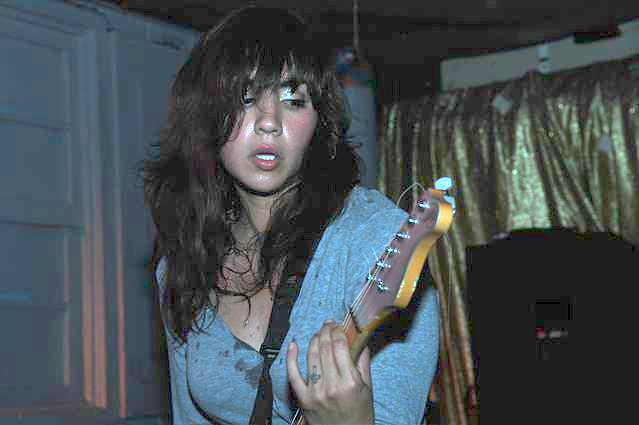 About
a decade later the gamble has paid off – in spades. The group – named
after the 1987 Smiths’ single “Girlfriend in a Coma” – has exploded onto
the indie scene. Only two albums into their career they have built up a
base of fans and played in huge tours like the Warped Tour, the True
Colors tour, opening for the Pogues, Tegan and Sarah, and yes, even
former Smiths lead singer Morrissey.
About
a decade later the gamble has paid off – in spades. The group – named
after the 1987 Smiths’ single “Girlfriend in a Coma” – has exploded onto
the indie scene. Only two albums into their career they have built up a
base of fans and played in huge tours like the Warped Tour, the True
Colors tour, opening for the Pogues, Tegan and Sarah, and yes, even
former Smiths lead singer Morrissey.
“That whole thing
felt very surreal. As soon as it happened, we just had to get into work
mode. We think now, ‘Oh shit, we’ve opened up for Morrissey.’ But we
know Boz Boorer, who is Morrissey’s musical director. We met him a few
years back. He helped record a demo for us. I remember I dropped out
of junior year, it was before Christmas vacation. We were there
[London] for a week. Since then, we kept in contact, so he’s always
known of us. We happened to be in New York when Morrissey was and he
had just gotten rid of his original opening act [Kristeenyoung]. He
needed an opening act, so they asked us if we’d like to do it. Of
course, we jumped. We cancelled a show we had that night,” she laughs,
“and went down to see Morrissey.”
Of course, before
they got to go down to see Morrissey, Girl in a Coma had to be seen
themselves.
Some of the band’s
earliest notice was when they were tapped for a cable TV documentary
series called Jammin, which was focusing on upcoming Mexican
American bands.
The Jammin
crew still play a huge part in Girl in a Coma’s career. It was created
by Faith Radle – who is currently their manager – and shot by Jim
Mendiola, who creates the group’s music videos. The series also
introduced the band to two of their mentors and biggest supporters.
“They’re from San
Antonio and they asked some friends, ‘Is there any bands you could
suggest for us to do this pilot episode on?’ We were just starting out,
so they told them to give us a listen. They liked us, so they came down
to San Antonio. At the time, we were living with a friend and they
followed us with a camera for a couple of weeks – which is kind of
weird, because I’m usually really private. There are a lot of shots of
my door shut,” she laughs.
“There are some
scenes of me in there, but like a lot of things, while they are
happening you don’t really think about it until after it’s done. The
whole thing was a lot of fun. Then, at the end, of course getting to
meet Joan Jett and being able to sign on to Blackheart Records…”
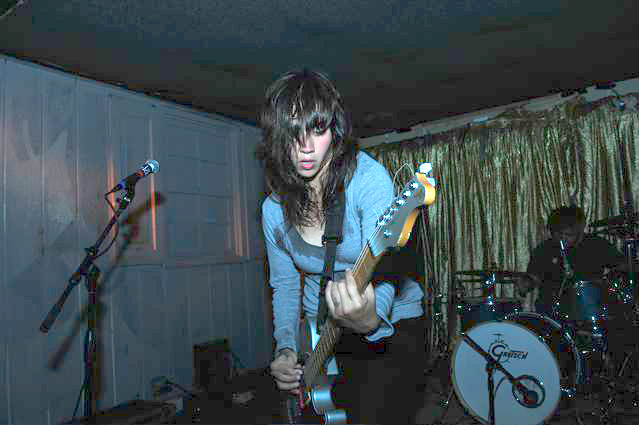 Jett
and Kenny Laguna – her long-time musical partner, were invited onto the
show to meet the band at a New York showcase gig. The two took it one
better – offering the band a record contract on the spot.
Jett
and Kenny Laguna – her long-time musical partner, were invited onto the
show to meet the band at a New York showcase gig. The two took it one
better – offering the band a record contract on the spot.
Despite the fact
that most of Jett’s big hits came out before Nina was born, Diaz was
very familiar with the music of this pioneering woman rocker.
“Ma listened to
Joan Jett and the Blackhearts and Phanie listened to the Runaways and
Joan Jett and the Blackhearts, as well, so I knew of her,” Diaz says.
Despite the fact
that Blackheart Records is an indie label, Diaz is certain that the band
has landed in the perfect situation with the imprint.
“It’s like a big
family,” Diaz says. “They’re very helpful. They give us great tour
support. Any time we need advice, Joan’s always there. Kenny Laguna is
always there. It’s like a big family. I wouldn’t want to be on any
other label at this time.”
Diaz even felt
comfortable enough with Jett to ask her to sing backing vocals with her
on the song “Joannie in the City,” which appears on the new Trio B.C.
disk.
“Originally it was
called ‘Johnnie in the City,’ but I had a fallout with that name and I
didn’t want to keep saying it,” Diaz explains. “So the girls said ‘Why
don’t you call it ‘Joannie in the City?’’ I hadn’t finalized lyrics yet
and I thought, well, yeah… It kind of makes sense, you know? It’s a
rocking song. It seems like something she might even like to play
herself. So I just wrote the lyrics for her. When it came time to do
the studio in New York, she was down to do whatever we needed. I
suggested maybe she could sing in the background. Maybe we could do
little harmonies here and there. She was totally down. Anything we
needed to do. She’s a lot of fun to work with. She’s very blunt. She
doesn’t want to change anything. She’s very raw. That’s what makes her
her – which is amazing.”
Girl in a Coma’s
trail with Blackheart started with the 2007 release of their debut CD
Both Before I’m Gone. The CD actually got a decent amount
of airplay and buzz for an indie release. The band also filmed videos
for the songs “Their Cell,” “Road to Home,” “Say” and “Clumsy Sky.”
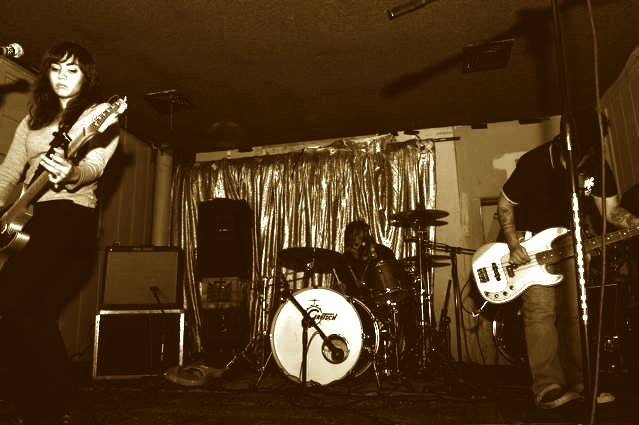 “I’ve
yet to hear it on the radio,” Diaz admits. “I’ve seen the video come
out on Logo. Then even just watching the Jammin episode being
shown on SiTV, it’s a little weird, because you don’t feel anything,
really. You think like, ‘Oh, cool, our video is up.’ You hear people
say, ‘Oh, I found out about you guys by seeing Jammin’ or ‘I
found out about you guys when your video popped up on Logo.’ So it’s
cool to know the thing’s growing. You’re in your own world growing as
well, with your own things. There’s a lot of other things going on.”
“I’ve
yet to hear it on the radio,” Diaz admits. “I’ve seen the video come
out on Logo. Then even just watching the Jammin episode being
shown on SiTV, it’s a little weird, because you don’t feel anything,
really. You think like, ‘Oh, cool, our video is up.’ You hear people
say, ‘Oh, I found out about you guys by seeing Jammin’ or ‘I
found out about you guys when your video popped up on Logo.’ So it’s
cool to know the thing’s growing. You’re in your own world growing as
well, with your own things. There’s a lot of other things going on.”
The growth
continues with the recent release of the follow-up CD, Trio B.C.
The album title is a little nod to Diaz’ grandfather.
“My grandfather
played the drums, he played the guitar, he played the accordion, violin
and he sang” she says. “He was just in a little band called Trio B.C.
Nothing big, they were just having fun – a bunch of guys drinking and
playing cool music. I guess always, if anyone in your family is
musically inclined, it gets passed on through generations. Like
Phanie’s real dad is a drummer – his name is David Garza. I guess
that’s where she gets her drumming from.”
Even more than on
the debut CD, Trio B.C. allows the band to stretch out
stylistically. “BB” starts out with a flamenco flourish, “Static Mind”
rocked, “In the Day” has a rockabilly feel, “Pink Lemonade” has a soft,
dreamy feel, “Empty Promise” is more punkish, “El Monte” is a ballad
that even had a bit of an old-fashioned feel.
“[The mix of
styles] just kind of popped up,” Diaz says. “There wasn’t any real plan
of ‘this is how the album is going to sound.’ Two of oldest songs on
there, ‘Trail’ and ‘Empty Promise,’ we wrote years back and we wanted to
put them on an album finally. The other songs I wrote on the road in
the van because we were touring for Both Before I’m Gone and I
was working already on the next album. Whenever we had time at home
we’d practice it. At the time, I started really getting into Sonic
Youth a lot and Nina Simone and Jeff Buckley. The girls were getting
into their own things. It’s like our different styles kind of crashed
together.”
Diaz writes much
of the music for the band – and all of the lyrics – but she still
considers it a completely collaborative process.
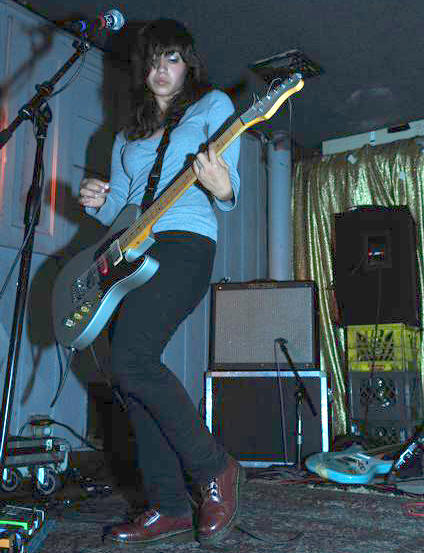 “It
starts off with… I write the concrete of it,” Diaz explains. “I write
the main thing, the whole thing pretty much, and then the girls come and
Jenn puts down her bassline and Phanie puts down her drums. Lyrics, I
kind of free flow as I’m writing and I record what I sing on my garage
band, then I listen back and I think if something caught my ears I write
it down. I have many drafts of some songs. Some songs just came out
naturally, like: Poof! There are the lyrics. Like ‘Pink
Lemonade,’ I wrote that one – I was working at a calling center back at
home and I wrote this song about lonely housewives and all they have to
comfort them is pink lemonade. It was kind of a sad story for the
lonely housewife.”
“It
starts off with… I write the concrete of it,” Diaz explains. “I write
the main thing, the whole thing pretty much, and then the girls come and
Jenn puts down her bassline and Phanie puts down her drums. Lyrics, I
kind of free flow as I’m writing and I record what I sing on my garage
band, then I listen back and I think if something caught my ears I write
it down. I have many drafts of some songs. Some songs just came out
naturally, like: Poof! There are the lyrics. Like ‘Pink
Lemonade,’ I wrote that one – I was working at a calling center back at
home and I wrote this song about lonely housewives and all they have to
comfort them is pink lemonade. It was kind of a sad story for the
lonely housewife.”
Sometimes the
stories are based in fact. Sometimes not so much… For example, there
is no specific “Baby Boy” who inspired the song of that title.
“That one I was
trying to play around with funky, fun lyrics. I was listening to a lot
of Sonic Youth when I wrote ‘Baby Boy.’”
The styles were
also massaged by three interesting sets of producers. Jett and Laguna
handled the boards on a few songs, as did Sparta/Sleepercar vet Gabe
Gonzales and super-producer Greg Collins (U2, No Doubt).
“Greg Collins is a
friend of our managers,” Diaz says. “We met him a couple of years
back. He came to a show. We kept in contact. She suggested that we
should try him out to be one of the other producers. He’s just
amazing. He’s really good to work with. He opened up our minds to try
out new things. He talked to us in a nice way where we control – not
locked in or anything. I’m very stubborn when it comes to trying out
new things, but he made it with ease and in the end we were very happy
to have been able to work with him and will hopefully work with him
again soon.”
The album closes
with a rocking cover of a 60s Spanish rock nugget – “Ven Cerca” by Los
Spitfires. Beyond the song being their first remake on one of their
albums (though they did redo a couple of holiday classics on the
compilation A Blackheart Christmas), “Ven Cerca” was also the
first time that Girl in a Coma recorded in Spanish.
“We did a Mexican
rock show two years back and we performed some songs in Spanish,” Diaz
recalls. “We do a handful of them. All of them are a lot of fun to do,
but ‘Ven Cerca’ popped out a lot to us. It definitely paved the way for
a path for our style of writing. The original version is very cool and
Los Spitfires is a very cool band. Usually I like to sing along when
I’m in the studio, but even more so when I was doing ‘Ven Cerca,’
because our manager knows Spanish very well and I knew she’d be picking
at every word.” She laughs at the memory. “At times I’d get
frustrated, but at the end it came out sounding pretty good.”
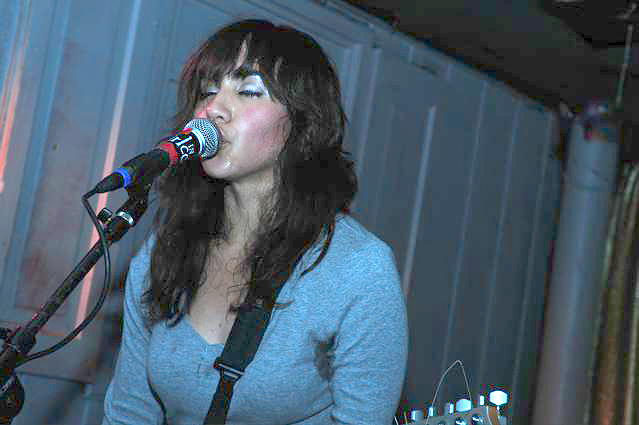 Now,
with Trio B.C. renewing the critical acclaim and audience buzz,
Girl in a Coma is at an interesting place in their career. They can
take part in huge tours like Morrissey, the WARPED tour and the True
Colors tour, but they also can play little club dates like a recent show
at the Khyber in Philadelphia.
Now,
with Trio B.C. renewing the critical acclaim and audience buzz,
Girl in a Coma is at an interesting place in their career. They can
take part in huge tours like Morrissey, the WARPED tour and the True
Colors tour, but they also can play little club dates like a recent show
at the Khyber in Philadelphia.
“I have come to
enjoy everything,” Diaz says. “There was a time when I just liked
playing the smaller venues, but then when you play bigger ones… there’s
different vibes, but at the end of it, it’s always great. It’s always
lots of energy. The other day we played a show and there was only like
three people there, but we knew that those three people were really
there to see us and enjoy themselves. Get away from their everyday
thing and have fun. So we always give it our all – no matter if it’s
one person or a thousand people.”
And what would
Nina Diaz like to say to those people with her music?
“I’d like them to
when they hear our music to get away from whatever is bothering them,”
Diaz sums up. “Or help them figure out what’s bothering them. To be
their answer and never cause them any more confusion.”